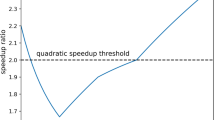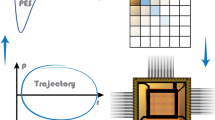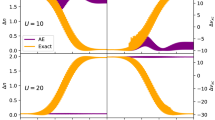Abstract.
Quantum molecular dynamics describes the time-evolution of a chemical system at the atomic level by directly solving the Schrödinger equation. Time-dependent methods, exemplified by wavepacket propagation, are by now developed to a point where they provide an important insight into the mechanism of many fundamental processes. Of these methods, the most versatile and efficient is probably the multi-configuration time-dependent Hartree (MCTDH) method. The form of the wavefunction used leads to a particularly compact description of the system, and it is possible to run either qualitative, cheap, or accurate, expensive calculations within the same framework. MCTDH has now shown that it is able to treat systems much larger than other wavepacket propagation methods, and benchmark calculations on systems with up to 24 degrees of freedom have been made. In contrast, standard methods can rarely treat more than 4–6 degrees of freedom. In the following, we review the basic theory of MCTDH. Recent advances are included, such as the development of the method for treating the time-evolution of density operators.
Similar content being viewed by others
Author information
Authors and Affiliations
Additional information
Received: 27 November 2002 / Accepted: 30 January 2003 / Published online: 30 April 2003
Correspondence to: H.-D. Meyer e-mail: dieter@tc.pci.uni-heidelberg.de
Acknowledgements. The very first MCTDH program was written by Uwe Manthe as part of his Ph.D. work in Heidelberg. Over the years several graduate students, post-docs and visitors have made contributions to the MCTDH package. We list them in chronological order: A. Jäckle, M. Beck, M. Ehara, M.-C. Heitz, A. Raab, S. Wefing, S. Sukiasyan, C. Cattarius, F. Gatti, and F. Otto. We are very, very grateful to all of them! H.D.M. thanks C. Cattarius for providing the “operate” formulas for density operators and H. Wang for many fruitful discussions on “cascading” during a visit to Berkeley, 2001. H. Wang independently had developed ideas which were very similar to cascading. Last but not least, H.D.M. thanks L.S. Cederbaum for his strong support of the MCTDH project. Financial support by the Deutsche Forschungsgemeinschaft is gratefully acknowledged.
Rights and permissions
About this article
Cite this article
Meyer, HD., Worth, G. Quantum molecular dynamics: propagating wavepackets and density operators using the multiconfiguration time-dependent Hartree method. Theor Chem Acc 109, 251–267 (2003). https://doi.org/10.1007/s00214-003-0439-1
Issue Date:
DOI: https://doi.org/10.1007/s00214-003-0439-1




